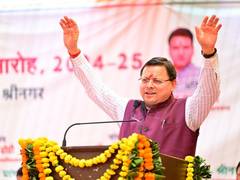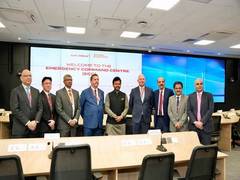Architect of modern India: Cong pays tributes to Nehru on death anniversary
New Delhi, May 27 (PTI) The Congress on Monday paid rich tributes to India’s first prime minister Jawaharlal Nehru on his death anniversary with party chief Mallikarjun Kharge saying the country’s history is incomplete without the incomparable contribution of “the architect of modern India”.
Kharge and former Congress president Sonia Gandhi also paid floral tributes to the former prime minister at his memorial ‘Shantivan’ here.
In a post in Hindi on X, Kharge said the history of India is incomplete without the incomparable contribution of Pandit Jawaharlal Nehru, the architect of modern India, who took India forward in scientific, economic, industrial and various fields.
Nehru was a dedicated guardian of democracy and our source of inspiration, he said.
“Our humble tribute to “Hind ke Jawahar” on his death anniversary,” Kharge said.
The Congress president quoted Nehru as saying that the protection of the country, progress of the country, and unity of the country is the national religion of all of us.
“We may follow different religions, live in different states, speak different languages, but that should not create any wall between us. All people should get equal opportunity in progress. We do not want some people in our country to be very rich and most of the people to be poor,” Nehru was quoted as saying.
Even today, the Congress party is following the same path of “justice,” Kharge said.
Former Congress president Rahul Gandhi also paid tributes to his great grandfather.
“Respectful tributes to the architect of modern India and the first Prime Minister of the country, Pandit Jawaharlal Nehru on his death anniversary.As a visionary, he dedicated his entire life to building India through the freedom movement, establishing democracy, secularism and laying the foundation of the Constitution. His values will always guide us,” Gandhi said in a post in Hindi on X.
Congress general secretary Jairam Ramesh paid rich tributes to Nehru on his 60th death anniversary.
“On May 22, 1964 Nehru conducted his usual almost-monthly freewheeling press interaction. Towards the end of that meet he was asked about succession and he jokingly replied: ‘my life is not ending very soon’,” Ramesh recalled.
“Nehru then spent a few days in Dehradun from where we have his very last photo alive. He returned to New Delhi on May 26th. Perhaps the last act of his that night was to write a letter to Seiiche Hirose in Japan. A few hours later, in the early morning of May 27th at 6:25 am, Nehru lost consciousness, and he was declared dead at 2 pm,” he said.
Ramesh note that all through his extraordinary history-shaping life, Nehru was profoundly influenced by the life and message of the Buddha.
“His study and bedroom are a testimony to that long-standing fascination. Quite amazingly his very last day on earth would be on Buddha Purnima Day and his very last letter would be to a devout Buddhist,” he said.
Nehru’s reading of history and his desire to connect antiquity to the new republic of India that was being established led him to champion the use of two legacies of Buddha’s greatest propagator Emperor Ashoka – the chakra in the national flag, and the Sarnath lion capital as the national emblem, Ramesh said.
India’s first and longest-serving prime minister, Nehru, died in office in 1964.






